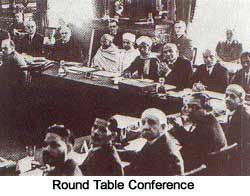|

|
Ancient
Medieval
Modern
Chronology
|

|
| |
After deliberating amongst itself for close to three weeks, and after long discussions with delegates who had returned from London, and with other leaders representing a cross-section of political opinion, the Congress Working Committee authorized Gandhiji to initiate discussions with the Viceroy. The fortnight long discussions culminated on 5 March 1931 in the Gandhi-Irwin Pact, which was variously described as a 'truce' and a 'provisional settlement'.
 The Pact was signed by Gandhiji on behalf of the Congress and by Lord Irwin on behalf of the Government. The terms of the agreement included the immediate release of all political prisoners not convicted for violence, the remission of all fines not yet collected, the return of confiscated lands not yet sold to third parties, and lenient treatment for those government employees who had resigned. The Government also conceded the right to make salt for consumption to villages long the coast, as also the right to peaceful and non-aggressive picketing.
The Pact was signed by Gandhiji on behalf of the Congress and by Lord Irwin on behalf of the Government. The terms of the agreement included the immediate release of all political prisoners not convicted for violence, the remission of all fines not yet collected, the return of confiscated lands not yet sold to third parties, and lenient treatment for those government employees who had resigned. The Government also conceded the right to make salt for consumption to villages long the coast, as also the right to peaceful and non-aggressive picketing.
However, the movement continued to linger till early April 1934 when the inevitable decision to withdraw it was taken by Gandhiji. Subhash Chandra Bose and Vithalbhai Patel had been much more critical of Gandhiji's leadership. In a strong statement rom Europe they had said in 1933 that 'Mr. Gandhi as a political leader has failed' and called for 'a radical reorganization of the Congress on a new principle with a new method, for which a new leader is essential.'
The end of this section
|




 The Pact was signed by Gandhiji on behalf of the Congress and by Lord Irwin on behalf of the Government. The terms of the agreement included the immediate release of all political prisoners not convicted for violence, the remission of all fines not yet collected, the return of confiscated lands not yet sold to third parties, and lenient treatment for those government employees who had resigned. The Government also conceded the right to make salt for consumption to villages long the coast, as also the right to peaceful and non-aggressive picketing.
The Pact was signed by Gandhiji on behalf of the Congress and by Lord Irwin on behalf of the Government. The terms of the agreement included the immediate release of all political prisoners not convicted for violence, the remission of all fines not yet collected, the return of confiscated lands not yet sold to third parties, and lenient treatment for those government employees who had resigned. The Government also conceded the right to make salt for consumption to villages long the coast, as also the right to peaceful and non-aggressive picketing.